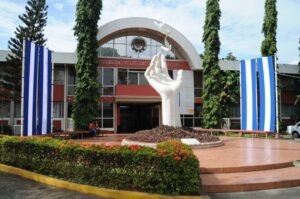Studying under the Ortega-Murillo dictatorship in Nicaragua is a synonym for poor quality education, uncertainty, partisan surveillance and political propaganda. “The quality of my education has gone down a lot. When I have doubts, I don’t get answers. I have to answer my own questions,” said Kary, a law student at the National Polytechnic University (UPN), formerly the Polytechnic University of Nicaragua (Upoli).
The young student pointed out that since the arbitrary closure of Upoli, last February 2, 2022 when it was stripped of its legal status along with other universities and educational institutions, the change has been drastic: professors have been fired, there is a continuous presence of paramilitaries inside the campus, in addition to the installation of surveillance cameras, and added to this, administrative problems and a total limitation on academic freedom.
“The first thing that happened after the cancellation of Upoli was the dismissal of teachers. We also did not know what to do because we were not informed what was going to happen with our grades and with the university,” says Kary.
The dismissal of the teachers limited Kary and her classmates’ education. Their educators were replaced by teachers aligned with the Sandinista Front who, when faced with students’ doubts related to laws, the State and the Political Constitution, always responded: “we don’t talk about politics in the classroom”.
Recibe nuestro boletín semanal
“Once I asked about a law that was reformed for the release of prisoners, and I wondered why it had been reformed if that generated insecurity and there was no plan to prevent prisoners from coinciding. I did not ask the question with a political aim, but I was curious, I wanted to know, but the teacher told me that we were not talking about politics and to change the subject,” she expresses.
Because of the gaps in knowledge, Kary and her classmates would go to a teacher who they knew was not a Sandinista and would answer any question about the degree. Their need was such that they began to take private classes with her.
However, the teacher was fired in August of this year, even though Kary and her classmates tried to prevent it with letters and signatures. Now she and other law students have no one else to turn to in order to fill the academic gaps created by the Ortega-Murillo dictatorship.
Students continue to pay, despite being “public” universities
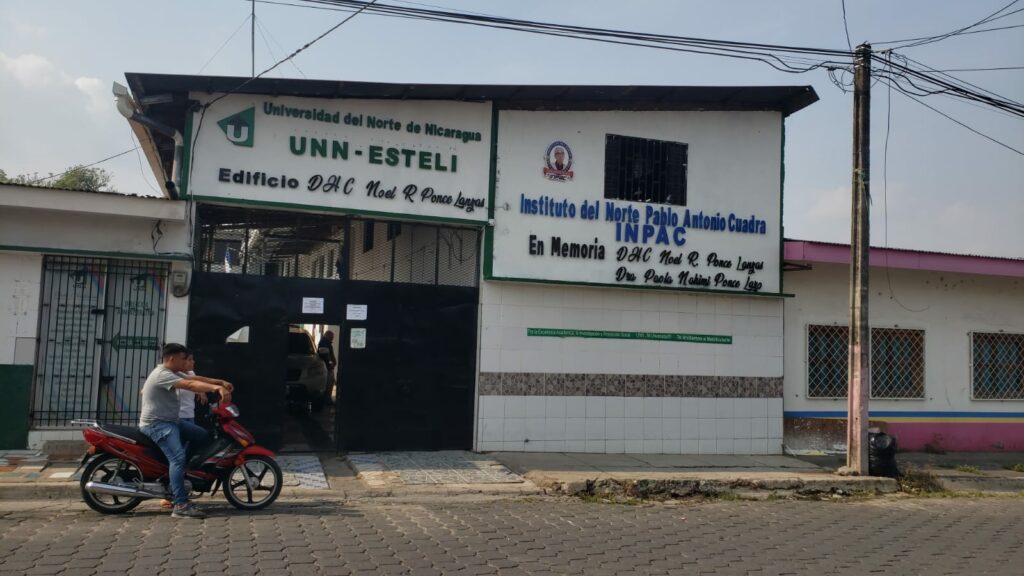
Between 2022 and August 2023, the Ortega-Murillo dictatorship cancelled the legal status of 27 private universities, confiscated their real estate and personal property, and replaced them with new names and de facto elected academic administrations.
One of the arguments used by the Ortega-Murillo regime to justify the confiscation of the universities was free education. According to the dictatorship’s discourse, students would not have to pay fees because the confiscated institutions now belonged to the State.
However, the student body continues to pay monthly fees as they normally did before the confiscation in all of the stolen institutions.
In the case of UPN, the fees were only reduced by five dollars. At Universidad Nacional Padre Gaspar García Laviana (UNPGGL) – a university that brings together several of the confiscated universities – the costs went up by five dollars and scholarship plans were suspended.
Jorge is a student at Universidad del Norte de Nicaragua (UNN), a university that was confiscated and absorbed by UNPGGL. “The promise of Gaspar University is that it is going to be part of the 6% of the budget for higher education and is going to be financed by the State, but I don’t believe it,” he says.
UNPGGL also groups other students from the extinct Autonomous Christian University of Nicaragua (UCAN), University of Integration of Latin America (Unival) and Ruben Dario University, all located in the north of the country and totally closed by the regime.
According to Jorge, students from all these closed universities were forced to re-enroll, for which they paid a fee of US$100, in addition to the monthly tuition. In addition, the university students share the same classrooms and professors, but pay the fees established by their university of origin, says Aura, another student of the new UNPGGL consulted by DIVERGENTES.
For example, students from Universidad Martin Lutero (UML), Universidad de Occidente (UDO) and UCAN, all unified and part of the UNPGGL, share classes, but each student pays what is set by the university they come from.
“By unifying them we expected the payments to be unified. Instead, students from former UCAN pay $160 and those from UDO pay $100, currently receiving classes in the same classrooms with the same teachers,” says Aura. “It’s an administrative mess,” says the student.
Gaps in education and knowledge
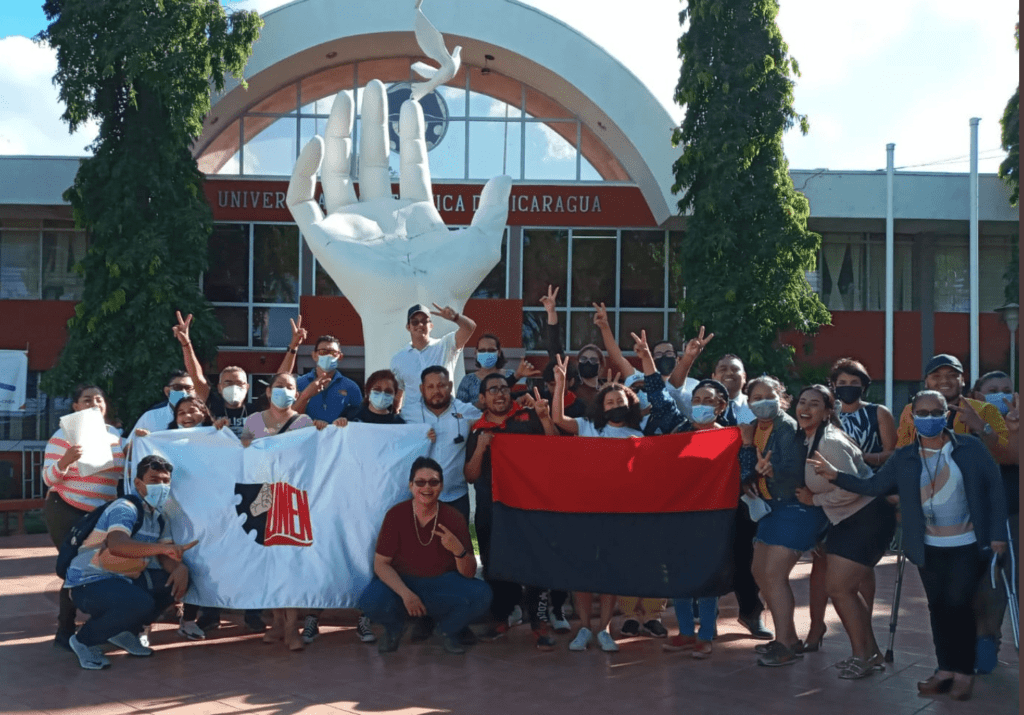
Kary pointed out that until before the Upoli confiscation, there were 50 students in her classroom. There were so many that they had to take classes in the university auditorium and not in the classrooms because they were too small.
After the confiscation many of her classmates left. Currently she estimates that there are around 25, since most of them left the university or left the country.
In addition to migration, the most serious aspect of the confiscations of the universities is the lack of knowledge, culture and professional training that the Ortega-Murillo regime is creating by limiting the students’ education, says Adrián Meza, former rector of the former Paulo Freire University (UPF), now confiscated and called Ricardo Morales Avilés University.
“The university is configured in its essence by its academic practice and its educational practice, but now we have large garage universities because they do not have scientific content, do not encourage critical thinking and do not have academic freedom. And that is what universities do, universities are not made by buildings,” he explains.
Although the Ortega-Murillo dictatorship maintains a discourse of academic freedom and updating of knowledge with renovations to the curriculum of the confiscated universities, the professor points out that this is only a measure of the regime to give its approval on the subjects to be taught.
Although in the new universities administered by the regime the teaching staff maintains the order “not to talk about politics in the classroom”, this does not prevent them from maintaining permanent political propaganda campaigns about the Sandinista Front to the students.
“The new professors keep telling us to thank the commander for the new public university we have”, says Kary, in addition to all the political activities carried out by UNEN inside the campus. One of the professors even asked one of his classmates to do research on “terrorism” in Nicaragua, thus promoting the discourse maintained by the regime on the social protests that occurred in 2018.
Confiscated universities present administrative and registration problems
At the beginning of 2023, UPN received students from other confiscated universities, including Unival, which was completely closed in December 2022. Its student body was forced to transfer to this institution of higher education by orders of the National Council of Universities (CNU).
Due to the different curricula, many students coming from Unival have had to take more classes than their peers. They also have to attend more days to the campuses and take subjects even on weekends.
Some students have to take new classes and discard some that they have already taken and paid for. In the case of former UNN -now UNPGGL- it received dozens of students from the other confiscated universities and is currently facing a problem with class schedules due to the number of students enrolled in courses.
According to Jorge, there is now an overpopulation of students at the university, which exceeds class quotas, so students must enroll in the subjects they can even if it causes problems with their schedules.
“We are now four universities in one and we have wide lapses in schedules. There are people who come in at 7 a.m., leave at 8am, go back to classes until 12 noon and leave at 1pm, and again have classes until 3pm,” explains the student.
These schedule changes mainly affect university students from Madriz or Nueva Segovia, who have to travel to Estelí to continue their studies.
Eternal administrative problems
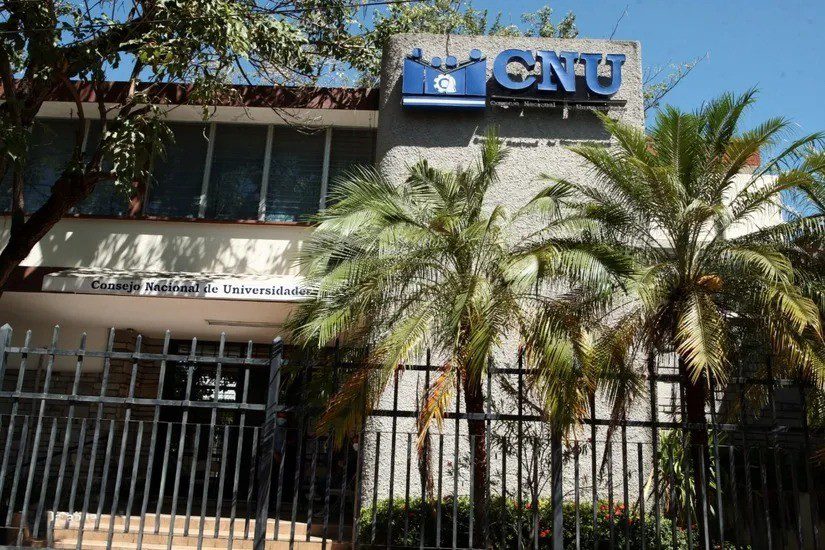
On the other hand, the universities present various administrative problems in terms of student registration, payment and enrollment. For example, at UPN -formerly Upoli-, Kary had difficulties paying for five months, so her fees accumulated and in the end she had to pay almost 4,000 córdobas.
Registration authorities also told her on different occasions that she did not appear in the system, that is, that she did not exist as a student; and they told her that she had not taken any courses, even though she was in the third year of her degree. Although these problems have been solved little by little, they are common among the student body.
This uncertainty and problems in the administration cause her to fear that she will not be able to continue studying and finish her degree. “I feel that at any moment they are going to say ‘goodbye, we’re glad you came,’ because it’s not normal,” she says.
The same thing happens in the other confiscated higher education institutions. Ricardo Morales Avilés University -formerly UPF- is no exception, says Adrián Meza.
“We are surprised that there are registration problems because the same day that UPF was closed all the registries were handed over, even the director of registration stayed working with them. How is it that there are registration problems?” he says.
In the case of former UNN, students cannot request transcripts or documents verifying their academic status, Jorge points out, despite the fact that it has been five months since the university was taken over by the State.
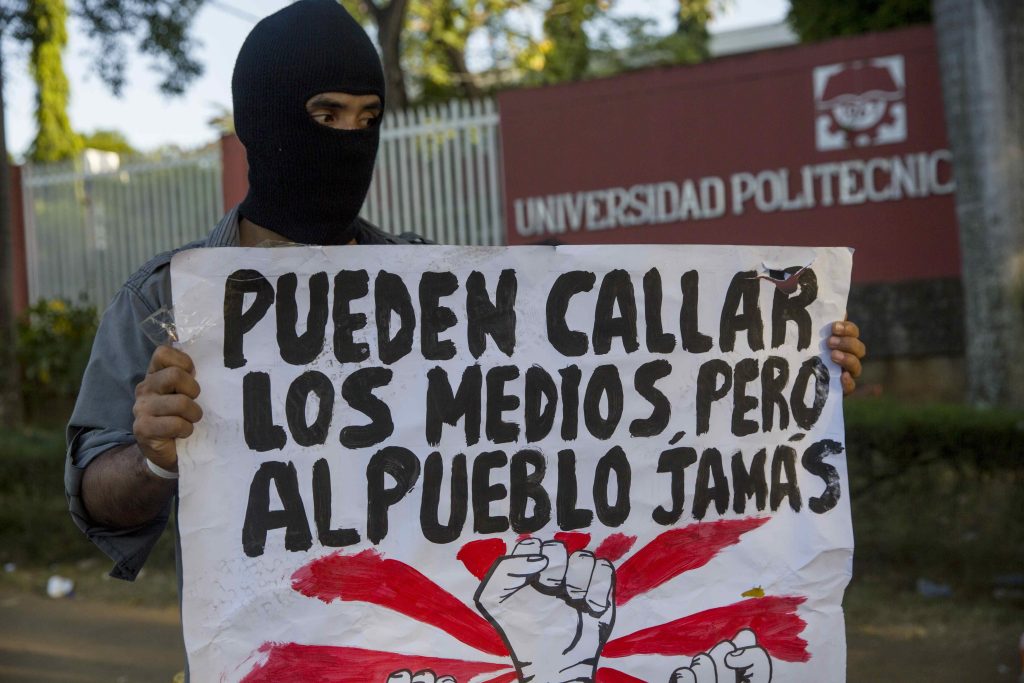
“I tried to get my certificate, but it’s not possible. We can take pictures of the grade sheets to verify and have a base, but they don’t give us certificates per se,” says the young student.
Faced with the complex realities in the confiscated universities, young people like Kary just want to finish their studies even if they cannot work in Nicaragua. “I feel very bad, I just want to finish. I love my degree (law), but I know that I’m not learning anything at all and that maybe there are things that are more worthwhile than being there under surveillance,” she says.

